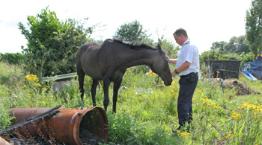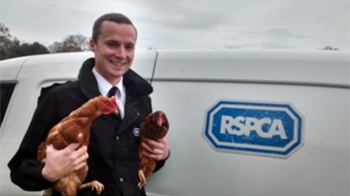Information for vets on reporting concerns
Reporting and sharing information on cases of suspected animal cruelty and neglect: Client confidentiality and GDPR
The law, as set out in the Animal Welfare Act, clearly sets out the offences that occur when an animal is allowed to suffer unnecessarily, or where its needs are not being met.
As veterinary surgeons, it is important to understand the law and the role of the vet as set out in the law.
The principal responsibility of a veterinary surgeon is to protect the health and welfare of the animals under their care. Client confidentiality and GDPR are important, but so is animal welfare law. If there are concerns the owner or keeper of the animal is harming them or is likely to do so, either deliberately or by neglect, then the vet should always consider the animal's welfare first, being sure to take due consideration of other professional responsibilities.
Please note that this advice is produced by the RSPCA and applies to England and Wales. The same RCVS rules apply to vets Scotland but the animal welfare laws are different and you should consult the SSPCA for advice if required.
FAQs:
I am worried I could get in trouble with the RCVS if I breach client confidentiality. Am I right to be concerned?
The RCVS expects veterinary professionals to make a full and considered assessment of a situation and follow steps to ensure the information disclosed is essential and justified, relevant and being disclosed to an appropriate body before releasing information.
The RCVS' supporting guidance to the Code of Professional Conduct provides good advice and makes it clear that reporting information to the relevant authorities without client consent is permitted if animal welfare or the public interest is compromised.
You do not need "permission" from the RCVS to disclose and nor will they give it. It is a matter for the individual veterinary professional to assess if the reporting is appropriate.
- 14.6 In circumstances where the client has not given permission for disclosure and the veterinary surgeon or veterinary nurse considers that animal welfare or the public interest is compromised, client confidentiality may be breached and appropriate information reported to the relevant authorities. Some examples may include situations where:
- a. an animal shows signs of abuse
- b. a dangerous dog poses a risk to safety
- c. child or domestic abuse is suspected
- d. where a breeder in England has presented litters without possessing a licence to breed, or has breached the licence conditions (where applicable)
- e. where the information is likely to help in the prevention, detection or prosecution of a crime
- f. there is some other significant threat to public health or safety or to the health or safety of an individual.
Remember animal cruelty and neglect as covered by sections 4 & 9 of the Animal Welfare Act (England and Wales) are crimes. Equally by reporting you are only alerting the appropriate investigating authority, so that further information can be gathered to ascertain if an criminal offence has been committed. You are not expected to be investigating and determining guilt yourself.
The RCVS considers the RSPCA/SSPCA to be an appropriate authority. The reporting structure is generally:
- a. an animal shows signs of abuse - RSPCA, SSPCA
- b. a dangerous dog poses a risk to safety - Police
- c. child or domestic abuse is suspected - Police
- d. where a breeder in England has presented litters without possessing a licence to breed, or has breached the licence conditions (where applicable) - Local Authority
- e. where the information is likely to help in the prevention, detection or prosecution of a crime - Police or R/SSPCA in relation to breaches of the AWA
- f. there is some other significant threat to public health or safety or to the health or safety of an individual. - Police, APHA
I've heard so much about GDPR and that I cannot share any data without consent. Does this mean I am unable to share information with the RSPCA/SSPCA?
It is important to understand data protection regulations, but these should not be a barrier to sharing of appropriate information in order to investigate a potential crime.
Consent is only one legal basis for processing data. Data protection regulations allow for certain scenarios, 'exemptions', where a data controller (here, vets) would be allowed to share personal data in a way that would normally be breach of confidentiality. Such an exemption is the prevention and/or detection of crime, so consent would not be required and normal data protection considerations about individual rights would be set aside. This is especially the case when notifying the person could 'tip them off' and hinder such an investigation.
What should I expect if the RSPCA requests clinical information about one of my clients?
The RSPCA is the principal investigator and prosecutor of animal welfare offences in England and Wales. The RSPCA is a charity and does not receive any Government funding for this work. It does not possess the legal powers needed to seize evidence (including animals) or enter premises by warrant and instead relies on the Police to do this. However, the RSPCA is recognised by the Police and the RCVS as an enforcement agency due to the investigatory and private prosecutory work it undertakes in relation to animal neglect and cruelty.
In what circumstance might the R/SSPCA request clinical information:
- Requests for records where the animal has not been reported by the practice - the R/SSPCA will have received reports of a concern from another source and the clinical information you hold is required to investigate a potential crime.
- Where your practice has reported a concern to the RSPCA, either due to welfare concerns on initial presentation or due to lack of compliance with advice (refusal to PTS, loss of follow up).
The RSPCA will only approach your practice with the request that you share personal information from one of your clients if this is deemed essential to progress an animal welfare investigation. Any request will always be confirmed in writing and you will be given options on how to pass the information on securely to the RSPCA Inspector. Often the Inspector can collect the information from your practice.
The Inspector should present you with either:
-a signed consent form from the owner giving permission for the information to be shared
OR
-an Inspectorate Personal Information Request Form
When considering any request of this nature consider the following:
- Does the request meet the requirements set out in the RCVS Code above
- Does the person dealing with the request have adequate understanding of the situation in question and the process for sharing data in these circumstances.
- Has the request been made in writing and signed by someone with sufficient authority. For example, an RSPCA Superintendent or a Police Officer.
- Is the information requested for the purpose of investigating or preventing crime.
- Do not provide any excessive or apparently irrelevant information. Only the information necessary for any potential criminal investigation should be disclosed.
- Record what information was disclosed and when and why the disclosure was made.
- As you are the data controller sharing personal data, it is up to you to prove that sharing the requested information is in accordance with the law. Therefore, if you need any more details to satisfy yourself the request is valid, you can ask the Inspector(s).
If you have any further questions, you should contact the RSPCA Inspector requesting the information and they should be able to assist you.
What will happen if I do not act on a welfare concern that I am aware of?
To knowingly not act on a situation where you believe that an animal is suffering or is not having its needs met, may mean that you are not meeting your obligations towards animal welfare.
In many cases through communication with the client and being aware of animal welfare law and the vet's role in it, these situations can be resolved earlier and without needing to go down the legal/ reporting route (see also Section 18 (3) below).
My boss feels I shouldn't get involved as it might reflect badly on the practice and it takes too long but I feel very strongly the animal is suffering. What should I do?
While no one wants to create friction between themselves and their boss it is important to remember the declaration you gave when graduating from vet school:
"...ABOVE ALL, my constant endeavour will be to ensure the health and welfare of animals committed to my care."
All vets' principle responsibility is to protect the health and welfare of the animals under their care. While the profession must take client confidentiality and GDPR very seriously, if there are concerns the owner or keeper of the animal is harming them either deliberately or by neglect, then the vet must think of the animal's welfare first.
Practices should consider what the public perception of them choosing not to report cases of suspected neglect and abuse could be and consider how the issue is dealt with by other medical professionals such as the human healthcare field. The link between animal abuse and human abuse is well documented and we would refer vets to the excellent resources produced by The Links Group.
Tactfully reminding senior colleagues of these professional obligations should allow you to proceed with disclosing your concerns to the RSPCA. If you still face resistance and you want to act you can consider the following options:
- Report the case to the RSPCA/ SSPCA who will be able to transfer the animal to a practice able to complete the investigation. It is still essential to conduct a thorough clinical exam, treat any suffering and make detailed clinical notes before the animal is transferred.
- Report the case anonymously to Crimestoppers
An owner has presented an animal that is clearly suffering, they have refused treatment or euthanasia and want to take the animal home. If I get them to sign a disclaimer am I absolved of any responsibility for the animal?
Under the Animal Welfare Act it is an offence to allow an animal to suffer unnecessarily and the Act sets out what can be done in this situation. The owner is responsible for their animal, but the signing of a disclaimer does not change the fact that an offence is being committed and that you are aware of it. It is important to explain this to the owner and often this knowledge can help resolve the situation in the animal's best interest. In cases where the owner insists on removing an animal that is in a suffering state then the appropriate course of action is to inform the Police and the R/SSPCA.
The Animal Welfare Act (Section 18 (3) contains provisions for euthanasia to be performed without client consent when a certificate is signed by a vet in presence of a Police Officer if the vet certifies that the condition of a protected animal is such that it should in its own interests be destroyed.
Can I collect evidence even if it's not yet clear if a criminal investigation is going to take place?
The guidance from the RCVS in this area is found in section 22.30 of the supporting guidance to the Code for Professional Conduct:
"22.30 It may not always be clear from the outset of a clinical case that evidence (in the form of samples) should be collected and retained. Veterinary surgeons should be alive to the possibility of a clinical case developing into a legal case, whether criminal (e.g. poisoning) or civil (e.g. negligent misdiagnosis), and, if suspicious or unsure, veterinary surgeons should consider collecting and retaining samples, with the consent of the owner of the animal or the person in control or possession of the animal. Apart from assistance from more senior colleagues, veterinary surgeons are advised to consider contacting the police, RSPCA or local authority officers if they are unsure about whether to collect evidence."



